2017--2018学年人教版选修七Unit 4 Sharing language points课时作业 (4)-精选教育文档
第一部分 选修七 Unit4 Sharing
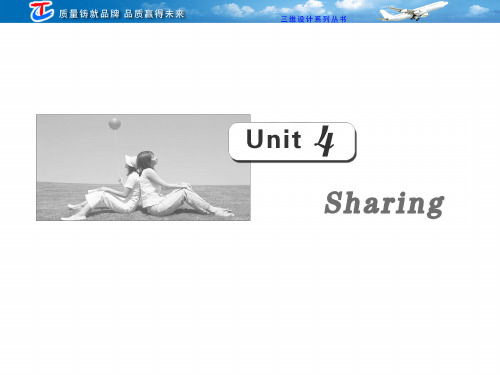
适应于(做)……
使自己适应于…… 调整,调节,适应 作出调整
①It took a while for his eyes to adjust to the blackness. 他用一小会儿的时间来让眼睛适应这个漆黑的地方。 ②This kind of desk can be adjusted to the height you need.Besides,it's not expensive at all.
return for society,he donated much money to a
patient in need,who was operated on last year. 他的父亲经营着一家大公司,在几个城市里运营 着且盈利很高。作为对社会的回报,他为一位去 年动了手术急需帮助的病人捐了一大笔钱。
3. remote adj.
遥远的;偏僻的
Байду номын сангаас
4. adjust vi.&vt. 5. otherwise conj. adv. 6. arrangement n. 7. purchase vt.&n.
调整;(使)适合 否则;不然 用别的方法;其他方面 安排;排列 买;购买 特权;特别优待 安全;保护;保障
opportunity to speak.所有参加辩论的人都有机会发言。
3.privilege n.特权;特别优待 [教材P30原句]It was such a privilege to have spent a
day with Tombe's family.
能与汤比一家度过一天的时间真是莫大的荣幸。 ①Senior students are usually allowed certain privileges. 高年级学生通常享有某些特权。
高二英语人教课标选修7Unit4Sharing教案.doc1
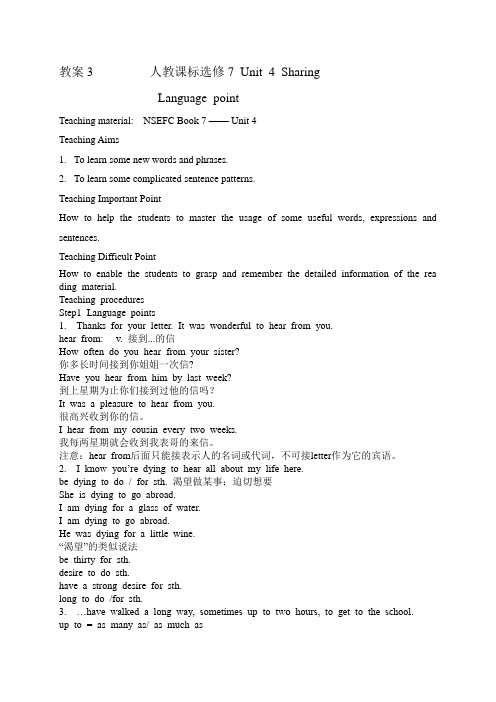
教案3 人教课标选修7 Unit 4 SharingLanguage pointTeaching material: NSEFC Book 7 —— Unit 4Teaching Aims1.To learn some new words and phrases.2.To learn some complicated sentence patterns.Teaching Important PointHow to help the students to master the usage of some useful words, expressions and sentences.Teaching Difficult PointHow to enable the students to grasp and remember the detailed information of the rea ding material.Teaching proceduresStep1 Language points1. Thanks for your letter. It was wonderful to hear from you.hear from: v. 接到...的信How often do you hear from your sister?你多长时间接到你姐姐一次信?Have you hear from him by last week?到上星期为止你们接到过他的信吗?It was a pleasure to hear from you.很高兴收到你的信。
I hear from my cousin every two weeks.我每两星期就会收到我表哥的来信。
注意:hear from后面只能接表示人的名词或代词,不可接letter作为它的宾语。
2. I know you’re dying to hear all about my life here.be dying to do / for sth. 渴望做某事;迫切想要She is dying to go abroad.I am dying for a glass of water.I am dying to go abroad.He was dying for a little wine.“渴望”的类似说法be thirty for sth.desire to do sth.have a strong desire for sth.long to do /for sth.3. …have walked a long way, sometimes up to two hours, to get to the school.up to = as many as/ as much asHe can earn up to $50,000 a year.up to 还可以表示1)be up to sth = be busy doing sth. 忙于2)It is up to sb to do sth 由某人负责做某事3)一直She lived at home right up to / until she got married.What are these naughty boys up to?It is up to me to do this task.I am not sure if she is really up to that job.4. I’m still trying to adapt to these conditions but, one thing is …adapt (oneself) to 适应,适合The new students are very slow to adapt to the rules.新生对于那些规定适应得很慢。
【范文】人教版高中英语选修7教案Unit 4 Sharing
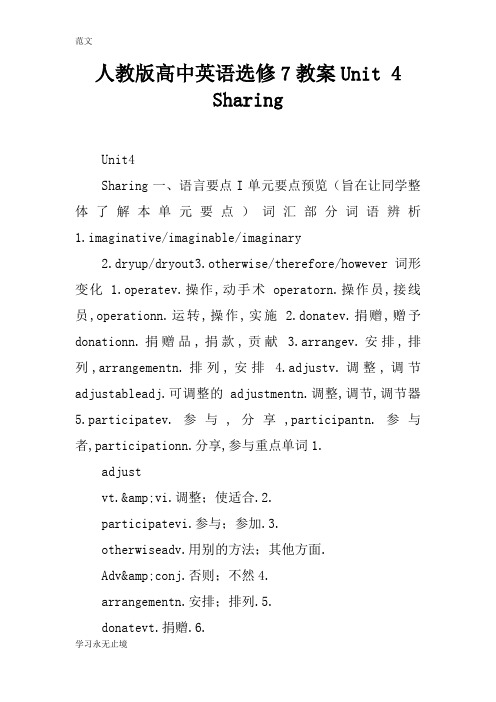
人教版高中英语选修7教案Unit 4SharingUnit4Sharing一、语言要点I单元要点预览(旨在让同学整体了解本单元要点)词汇部分词语辨析1.imaginative/imaginable/imaginary2.dryup/dryout3.otherwise/therefore/however词形变化 1.operatev.操作,动手术operatorn.操作员,接线员,operationn.运转,操作,实施 2.donatev.捐赠,赠予donationn.捐赠品,捐款,贡献 3.arrangev.安排,排列,arrangementn.排列,安排4.adjustv.调整,调节adjustableadj.可调整的adjustmentn.调整,调节,调节器5.participatev.参与,分享,participantn.参与者,participationn.分享,参与重点单词1.adjustvt.&vi.调整;使适合.2.participatevi.参与;参加.3.otherwiseadv.用别的方法;其他方面.Adv&conj.否则;不然4.arrangementn.安排;排列.5.donatevt.捐赠.6.purchasevt.&n.买;购买.7.distributionn.分配;分发;分布状态.8.relevantadj.有关的,相应的9.operatev.操作,运转,开动,起作用重点词组dyingto.极想;渴望.theotherday几天前stickout.伸出inneed.在困难中;在危急中.重点句型1.whenIreachtheschoolgroundstherearelotsof “goodmorning”formefromtheboys.2.youaskedwhetherI’mgettingtoknowanylocalpeople.3.Thegiftcoversthecost ofexercisebooksandtextbooksforcommunityprimaryschoo lsthatoperateinpoororremotevillages.重点语法限制性定语从句II词语辨析1).imaginative/imaginable/imaginaryadj.【解释】imaginative富有想象力的,创新的imaginable可想象得到的imaginary想象中的,虚构的【练习】选择imaginative/imaginable或imaginary并用其适当的形式填空1)Althoughthemaincharactersinthenovelaresotruetolif e,theyare_______.2)It’s_______forsuchan_______writertocreate_______storie s.3)Thisistheonlysolution_________.4)Thefamouspoemwasfroman______poet.keys:1)imaginary2)imaginable;ima ginative;imaginary3)imaginable4)imaginative2).dryup /dryout【解释】dryup使完全变干;(河流,湖泊等)干涸dryout变干,干透【练习】选择dryup或dryout,并用其适当的形式填空1)Thefarmerspumpedwatertotheirfieldstostopthesoil__ ______.2)Thepool________inthelateautumn.3)Thevillag ershadtowaitforthesunto_________thedirtroad.4)Don’tleavethevegetableonthetable,oritwill________.keys: 1)dryingout2)driesup3)dryup4)dryout3)otherwise/ther efore/however【解释】otherwise否则;不然thereforeadv.因此,所以however无论如何,可是【练习】选择otherwise/therefore或however并用其适当的形式填空1)Hedidn'tworkhardatEnglish_______hewouldn'tfinditd ifficulttolearnnow.2)wedonothaveenoughmoney._____ ____wecannotaffordtobuythenewcar.3)Thefirstpartwas easy;thesecond,________,tookhours.4)Heisnoisy,but________aniceboy.5)weweregoingtoplayfootball,butitwassohotthatwedecidedtodo_____________.keys:1 )otherwise2)Therefore3)however4)otherwise5)otherwiseIII词性变化(旨在提供语法填空所需材料)1.operatev.操作,动手术operatorn.操作员,接线员,operationn.运转,操作,实施2.donatev.捐赠,赠予donationn.捐赠品,捐款,贡献 3.arrangev.安排,排列,arrangementn.排列,安排 4.adjustv.调整,调节adjustableadj.可调整的adjustmentn.调整,调节,调节器5.participatev.参与,分享,participantn.参与者,participationn.分享,参与【练习】根据句子结构,用括号内所提供词的适当形式填空1)Theyencouragedthe_______to_______inthesingingperf ormanceafterthecontest..2)Thedoctorare________onan______ofafactorywhogotinjuredwhen_______amachine,and the________issaidtolastovertenhours.3)Theseatsinthe planeare________,andyoucan________themtoacertainang le.The______isnotdifficulttomake.4)Thedrinkswere________tothembycocacolacompanyandtheyreceived_______f romothercompaniesaswell.5)ourdepartmentwillbeinchar geof_______theconference.wouldyoupleasegiveussomesu ggestionsonthe_______forit?keys:1)participants;part icipate2)operating;operator;operating;operation3)ad justable;adjust;adjustment4)donated;donation5)arran ging;arrangementIV重点词汇(旨在提供综合运用所需材料)1.adjustvt.&vi.调整;使适合.[重点用法]adjustmentn.调整;修正adjustableadj.可调节的;可调整的adjust使适应;适应。
人教版高中英语选修七Unit4Sharing
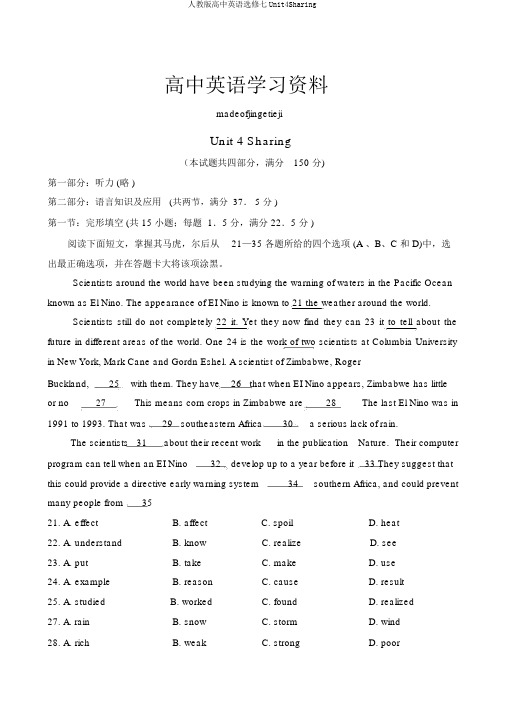
高中英语学习资料madeofjingetiejiUnit 4 Sharing(本试题共四部分,满分150 分)第一部分:听力 (略 )第二部分:语言知识及应用(共两节,满分 37. 5 分 )第一节:完形填空 (共 15 小题;每题 1.5 分,满分 22.5 分 )阅读下面短文,掌握其马虎,尔后从21—35 各题所给的四个选项 (A 、B、C 和 D)中,选出最正确选项,并在答题卡大将该项涂黑。
Scientists around the world have been studying the warning of waters in the Pacific Ocean known as El Nino. The appearance of EI Nino is known to 21 the weather around the world.Scientists still do not completely 22 it. Yet they now find they can 23 it to tell about the future in different areas of the world. One 24 is the work of two scientists at Columbia University in New York, Mark Cane and Gordn Eshel. A scientist of Zimbabwe, RogerBuckland,25with them. They have26 that when EI Nino appears, Zimbabwe has littleor no27This means corn crops in Zimbabwe are28The last El Nino was in 1991 to 1993. That was29 southeastern Africa30 a serious lack of rain.The scientists 31about their recent work in the publication Nature. Their computer program can tell when an EI Nino32develop up to a year before it 33 They suggest that this could provide a directive early warning system34southern Africa, and could prevent many people from3521.A. effect B. affect C. spoil D. heat22.A. understand B. know C. realize D. see23.A. put B. take C. make D. use24.A. example B. reason C. cause D. result25.A. studied B. worked C. found D. realized27.A. rain B. snow C. storm D. wind28.A. rich B. weak C. strong D. poor29.A. as B. when C. while D. where30.A. received B. took C. suffered D. made31.A. wrote B. spoke C. told D. talked32.A. can B. will C. may D. shall33.A. can B. does C. will D. may34.A. to B. with C. for D. of35.A. leaving B. spreading C. expanding D. starving第二节:语法填空 (共 10 小题;每题 1.5 分,满分 15 分 )阅读下面的短文,依照上下文填人适合的词语,或使用括号中的词语的适合形式填空,并将答案填写在答题卷标号为36— 45 相应的地址。
人教版选修7 Unit4 Sharing 重点短语句型及语法

Book7 Unit 4必背句型1:1.It takes me only a few minutes to walk to school down a muddy track. (It takes sb. sth. to do…)相似句:The hut was dark inside so it took time for our eyes to adjust. 眼睛需要时间来调整适应。
2.The other day I was showing the boys the weekly chemistry experiment when, before I knew it, themixture was bubbling over everywhere!(was/were doing…when…正在做…突然…;before还没来得及)仿写:They were shopping when the hotel opposite the street fell down.他们正逛街突然对面酒店倒塌了。
The ruins fell onto them before they could fled from the spot.他们还没来得及跑出现场,废墟就砸他们身上了。
3.There was a newly made platform (for Jenny and me)to sleep on.新做了一个平台,是让我和珍妮睡觉用的。
(to sleep on作定语,与所修饰的platform有动宾关系,不能省略on, 不定式前有for sb, 可知是主动的)必背短语1:1.work as 充当;担任;担任…的工作→近义短语:serve as/ act as2.take photos of / take a photo of 给…拍照3.hear from 收到…的来信hear about 听到;得知;了解4.be dying to do渴望做;极想做→be eager/desperate/thirsty/greedy to do→long/desire to do →have a strong desire to dobe dying/eager/desperate/thirsty/greedy for sth. →long for→have a strong for 极想/渴望得到…5.be made of/from由…制成be made up of由…组成be made in在…制造6.up to 多达;直到;胜任;由…负责7.adapt to 适应→adjust to →make an adjustment to (作出调整以)适应adapt oneself to (使自己)适应= adjust oneself to (调整自己以)适应8.for sure 确定的(地);确切的(地)9.the other day 不久前的一天(典型的一般过去时的时间状语)e across (偶然)遇见;(偶然)碰到→run into11.be relevant to 与…相关;与…密切相关12.make a difference (to…)对…有影响;有所作为13.shake hands with 和…握手14.get through 通过;度过;完成;接通(电话等)15.participate in→take part in /join in16.dry out (指浸水等之物)变干;干透(become empty of water; to become completely dry)dry up (指河流、井、食物等)干涸(to become completely dry; to come to an end)dry off (使) 变干;使干透,弄干(to become dry on the surface)课文词块翻译1:1.have no concept of doing experiments 没有做实验的概念2.to be honest 老实说;说实话3.build a fire 生火4.covered the vegetables with banana leaves 用香蕉叶盖住蔬菜5.with grass sticking out of the roof 茅草伸出屋顶必背句型2:1.The gift you give is not something your loved one keeps but a voluntary contribution towards thelives of people who really need it.(not…but…并列连词,连接并列的结构,连接并列主语时,谓语动词与就近的主语保持一致;此句中含有三个定语从句)仿写:Such is life. The one who I loved didn’t love me while I didn’t love the one who loved me.人生如此奇妙。
人教版高中英语选修7 Unit 4《Sharing》(Period 4 using language)ppt课件

Skimming
what is this internet page made up of?
2. How much difference will your gift mean?
1. In what situations can you use the cards?
You can use the card for any special occasion weddings, births, birthdays, Christmas or anniversaries.
ntroduction a brief i________
catalogue a gift________
an attractive card ____
scanning
a brief introduction 1.Why are the gifts on the page unusual? 2.What will you get when you purchase an item?
A. how to send an attractive card to your special person
B. what to buy for poor countries’ education
C. encouraging people to buy gifts for some people of the world’ poorest
D. providing help only for women
人教版高中英语选修七Book VII Unit 4 Sharing.docx

高中英语学习材料***鼎尚图文理制作***选修Book VII Unit 4 SharingPeriod 1 Words & VocabularyClass:_____ Group:_______ No.:_______ Name:_______组内评价:_______教师评价:_______ 【Learning aims】:1.To consolidate the words, phrases and sentences of Unit 4 and improve the ability to use them.2.To form the knowledge tree by reciting and questioning.3.To devote yourself to class passionately and enjoy the pleasure of harvesting.【自主学习】(25分钟)内容和要求:1. 10分钟疯狂背诵单词、短语、句型、知识点用法。
2.15分钟默写以下单词、短语和句子。
I. Words and Phrases1.航空邮件n.___________2.fortnight ___________3.泥泞的adj.___________4.观念n.___________5.bucket ___________6.bubble___________7.相关的adj.___________ 8.遥远的adj.___________9.ridge ___________ 10.rectangle ___________11.平台n.___________ 12. 杂草n.___________13.tin___________ 14.jar___________15.嗅v.___________ 16.grill___________17.leftover___________ 18.特权n.___________19.邪恶的adj.___________ 20.扫帚n.___________21.收到......的信___________ 22.渴望___________23.dry out___________ 24.dry up___________25.参与___________ 26.调整___________27.对......有影响___________ 28.不久前的一天___________29.in need___________ 30.stick out___________II.重点词汇运用1. The only access to the building is along the (mud) track.2. In addition, (volunteer) work can help me build confidence and develop good communication skills.3. We have only told the people whose work is relevant this project.4. Don’t ________ your arm and your head ____________ the car window when it is moving.5. With ________________________(有太多家庭作业要做), I shall have a difficult time to spend.III.根据课文,完成以下句子:【自我引荐】背诵词汇表中的单词时,要重点记忆不扎实的词汇,注意边读、边写、边记。
Unit 4 Sharing人教版高中英语选修七

Have you ever helped…?
What do you do to help…
1. your parents?
clean the floor / wash dishes / prepare supper
高二选修7
Unit 4 Sharing
Warming Up, Pre-reading, Reading &Comprehending
学习目标
1.语言知识目标 a.认识以下单词和短语: volunteer,clinic,challenging,over the last few years,in the future,in two weeks' time,a couple of,developing country, b.注意以下几个重要句型: Why did Mary decide to work in a developing country?
2. other relatives? 3. your friends?
4. people in your community?
5. people outside your community?
take care of my cousin while his parents are away
repair their desks / help with lessons / accompany them to do shopping
Why were conditions in the clinics in the Sudan challenging? 2.语言技能目标 提高学生听前预测、注意细节信息等听力方面的技能。 3.语言能力目标 提高学生注意细节信息的听力能力,同时理解听力材料中出现的一些重要 的词汇和表达方式。
英语:Unit4《Sharing》Language-points(1)(新人教版选修7)

2) for sure 肯定如此, it /that. is for sure know sth. for sure 知道……肯定无疑 Soon he will turn to you for help and that’s for sure.
1) be dying for/ to do sth. 渴望, 极想, 渴望做某事 After a long dry season the trees are dying / thirsty for water. Nowadays there are more and more students dying to study abroad.
I hear from my mother every week. 每星期我都收到妈妈的信。
[比较] hear from和receive都可表示“收到 某人的信”。其区别如下: hear from不是指具体接到信件, 而是指得 到音信、信息; receive往往指收到具体的 信件。如:
I haven’t heard from him for a long time. 我好久没得到他的音信了。
make的用法: 1) be made from 由......制成 (看不出
原材料)
The paper is made from wood. 2) be made of 由......制成(看出原材
料)
The house is made of stone.
Remember them!
3) be made into 某种原材料制制成某种成品 Glasses is made into bottles.
hear of 还有“听从”的意思,常用于 否定句,与will / would连用,例如:
选修7unit4sharing单元教案
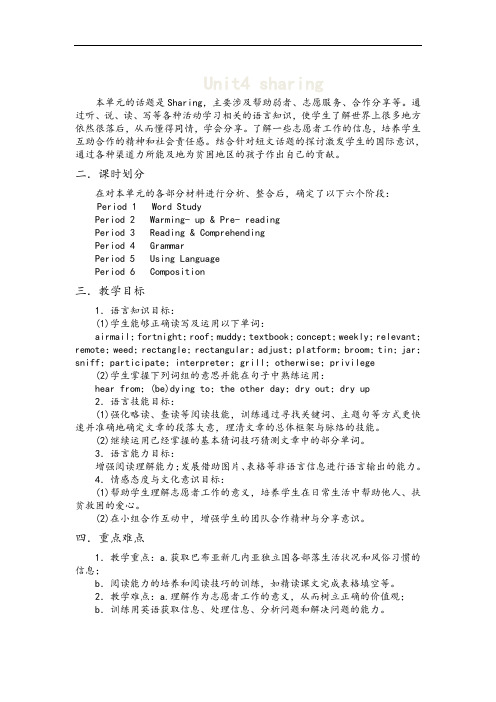
Unit4 sharing本单元的话题是Sharing,主要涉及帮助弱者、志愿服务、合作分享等。
通过听、说、读、写等各种活动学习相关的语言知识,使学生了解世界上很多地方依然很落后,从而懂得同情,学会分享。
了解一些志愿者工作的信息,培养学生互助合作的精神和社会责任感。
结合针对短文话题的探讨激发学生的国际意识,通过各种渠道力所能及地为贫困地区的孩子作出自己的贡献。
二.课时划分在对本单元的各部分材料进行分析、整合后,确定了以下六个阶段:Period 1 Word StudyPeriod 2 Warming- up & Pre- readingPeriod 3 Reading & ComprehendingPeriod 4 GrammarPeriod 5 Using LanguagePeriod 6 Composition三.教学目标1.语言知识目标:(1)学生能够正确读写及运用以下单词:airmail;fortnight;roof;muddy;textbook;concept;weekly;relevant;remote;weed;rectangle;rectangular;adjust;platform;broom;tin;jar;sniff;participate;interpreter;grill;otherwise;privilege(2)学生掌握下列词组的意思并能在句子中熟练运用:hear from;(be)dying to;the other day;dry out;dry up2.语言技能目标:(1)强化略读、查读等阅读技能,训练通过寻找关键词、主题句等方式更快速并准确地确定文章的段落大意,理清文章的总体框架与脉络的技能。
(2)继续运用已经掌握的基本猜词技巧猜测文章中的部分单词。
3.语言能力目标:增强阅读理解能力;发展借助图片、表格等非语言信息进行语言输出的能力。
4.情感态度与文化意识目标:(1)帮助学生理解志愿者工作的意义,培养学生在日常生活中帮助他人、扶贫救困的爱心。
高中英语人教版选修七Unit4SharingReading教案(系列二)

选修七Unit 4 SharingPeriod 1 Reading教学设计I.单元教学目标Ⅱ.目标语言Teaching Goal:1. Target languagevolunteer, hear from, be dying to, come across, relevant, stick out, doorway, adjust, platform, soft, softly, grill, dry out, dry up, privilege, arrangement2. Ability goalEnable Ss to learn about PNG and Jo’s work in PNG as a volunteer teacher3. Learning ability goalHelp the Ss lean how to read between lines and find the positive and negative aspects of doing something Teaching methods:Discussion, skimming, scanning and task-based methodTeaching AidA recorder, a projector and PPT.Teaching Procedures:Step 1 Warming-upT: Have you ever helped others? What did you do to help your parents? Or other relatives? Or your friends?Or people in y our community? Or people outside your community? I’m sure you have a lot to say. Ok, let divide into groups of three and finish the survey form. Then in groups, discuss whether someone who helps the groups on the survey form can be called a “volunteer”.Suggested answers:T: Which one can be called a volunteer? Or what kind of things do volunteers do?S: Volunteer work includes: Be a coach of the football lovers, plant trees, help people with disabilities.Step 2 Pre-readingAsk Ss to find out PNG on the map and discuss the photos in the reading passage.Photos 1 to 31.What was Jo’s job in PNG? ( a teacher)2.What kind of students were in her class? (Teenage boys. They are poorly dressed.)3.The classroom are made with wooden poles and have bamboo walls and grass roofs (except for the newscience lab which has a metal roof). The floor has bamboo matting on it. The walls do not reach the roofs (except the walls of the science lab). There is no glass in the windows.Photos 4 to 101.The village is very small. It is by a river at the bottom of a valley. It has steep slopes all around it.2.The village huts are small. They have no windows. They are made of wood and bamboo and have grass roofs.Meals are prepared and cooked outside. One of the crops grown is peanuts. The tool used for this crop is a digging stick. There is a woman carrying a naked baby on her shoulders. She is also carrying a heavy-looking bag. She has bare feet.Step3 Reading1. ScanningScanning the text and fill the blanks with their names.1.__Jo______ is a young Australian woman.2.___Rosemary____ was dying to hear all about Jo’s life in PNG.3.School boys walked a long way to get to school.4.Jo and her student s didn’t have an y textbook.5.Jo became a lot more imaginative when teaching.6.The boys started jumping out the windows during a chemistry experiment.7.Jenny and Jo visited a village that was the home of one of the boys, Tombe.8.Tombe’s mother, Kiak started crying “ieee ieee” to welcome them.9.Tombe’s father, Mukap led us to a low bamboo hut.10.Kiak was going to share the platform with Jenny and Jo.11.Tombe’s family softly talked to each other in their language Jo didn’t understand2. Read the text carefully and finish the chart.3.detailed reading Task-based (exercises 2 and 3 in comprehending part.) Exercise 2:Exercise 3:Step IV. HomeworkSuppose you've graduated from a key university and now you are a volunteer who works in the remote region to assist the basic education there. And you are to write a letter home to introduce your present situation. (you can refer to the text).。
高中英语人教版选修7Unit 4 sharing

Share your love with others, love spreads.
Enjoy what some famous people think about sharing.
If everybody offers a little
Have you ever helped…?
What do you do to help…
1. your parents? 2. other relatives?
clean the floor / wash dishes / prepare supper
take care of my cousin while his parents are away
problems. 把自己的想法、情感、经历告诉…
Sharing
Sharing is helping.
Sharing is enjoying. Sharing is understanding. Sharing is perfecting.
Share your happiness with others, happiness doubles.
巴布亚在马来语中意为“卷发人”。16世纪中叶, 葡萄牙人来到该岛时,见当地居民和自然景观很 像非洲的几内亚,故称之为新几内亚。
图案为一只极乐鸟停歇在两只皮鼓和一支长矛上。极乐鸟 为国鸟,寓意同国旗;皮鼓和长矛象征该国的传统文化。 下方的文字为“巴布亚新几内亚”。
• 首 都 :莫尔兹比港 Port Moresby • 面 积 :46.2万平方公里 • 人 口: 542万人 语 言 :英语 • 民 族 :美拉尼西亚族 • 宗 教 :基督教新教、拜物教 • 货 币 :基那 国庆节: 9月16日 • 时 差 :比北京时间早2小时 • 气 候 :热带雨林气候 • 道路通行:靠左行驶 • 别称:鳄鱼之都 • 主要财政收入:税收及国际援助
高中英语选修七教案:Unit4+Sharing+课文解析+

课文解析1. I know you’re dying to hear all about my life here. 我知道你一定很想知道我在这里的生活。
(P29)【要点提示】(be) dying to do sth. / for sth. 渴望,极想做某事/ 得到某物。
例如:I’m dying to know what happened. 我很想知道发生了什么事。
I’m dying for a glass of water. 我真想喝杯水。
2. I’ve included some photos which will help you picture the places I talk about. 我在信里附上了一些照片,看着它们你就应该能想象出来我所说的那个地方是个什么样子了。
(P29)【要点提示】picture n. 描绘,头脑中的情景、情形。
例如:I have a vivid picture of my grandfather smiling down at me when I was very small. 我清楚地记得很小的时候祖父向我低头微笑的情景。
Just a few years ago, the picture was very different.几年前,情况大不相同。
vt. 想象,描述。
例如:We found it hard to picture him as the father of teenage sons. 我们很难想象他居然是有几个十几岁儿子的父亲了。
【归纳拓展】picture sb. / sth. as ...把某人/ 某物想象/ 描绘成……; picture sb. doing sth. 想象某人在做某事。
3. They believe that any leftovers attract evil spirits in the night so the food is dried up in the can and the can is then thrown out of the hut.他们认为剩菜剩饭在晚上会吸引邪灵,所以把食物在罐子里弄干,然后把罐子扔到屋外。
2018年高中英语选修七课件:unit 4 sharing Period Two 精品

(2)完成句子 ①Food,clothing and water are distributed to the victims in the earthquake-stricken area. 在地震灾区,食物、衣服和水被及时地分发给灾民。 ②The teacher divided the watermelon into 10,and distributed them to 10 children . 老师把西瓜分成了10份,分给了10个孩子。
答案
返回
要点探究 探究重点 互动撞击思维
1.Would you like to donate an unusual gift?
你愿意捐赠一件不寻常的礼物吗?
归纳拓展
(1)donate vt.捐赠,捐献 donate sth.to...向……捐赠某物 (2)donation n.捐赠,捐献 make a donation to...向……捐赠
(1)not...but...不是……而是……,在此句中连接两个并列表语。 (2)not...but...还可连接两个并列主语,此时谓语动词采用就近原则,即根 据离动词最近的主语变化谓语动词的形式。 (3) 连 接 并 列 主 语 时 , 采 用 就 近 原 则 的 结 构 还 有 : ...or... ; either...or... ; neither...nor...;not only...but also...。
语境助记
(1)Please ensure that you purchase your ticket in advance. 请您务必提前购票。 (2)They purchased two sheep from the old man. 他们从老人那里买了两只羊。 (3)The statement lists all the purchases made with your card. 这张结算表单列出了你用卡采购的所有物品。
2018学年度人教版选修7Unit 4 SharingPeriod1Reading教案设计(10页word版)

2018学年度人教版选修7Unit 4 SharingPeriod1Reading教案设计(ALETTER HOME)IntroductionIn this period, after the warming up, students will first be guided to pre-read the text by getting to know about a place called Papua New Guinea. Then they shall read the text for forms and copy expressions. Writing a letter of your own comes before reading the text once again for the type of writing and summary of A LETTER HOME. The class shall end by students reading more on voluntary work.ObjectivesTo help students understand the text’s forms and contents and learn about sharingTo help students communicate on the topic in focus with the words, expressions and structures learned in this unitFocusAidsMultimedia facilities, tape-recorder, photos, diagramsProcedures1. Warming up by defining volunteerHello, class. Have you ever taken part in any volunteer work? No? Then welcome to our school volunteer work group. But first what is a volunteer?A volunteer is:* One who enters into, or offers for, any service of his own free will.* (Mil.) One who enters into service voluntarily, but who, when in service, is subject to discipline and regulations like other soldiers; -- opposed to conscript; specifically, a voluntary member of the organized militia of acountry as distinguished from the standing army.2. Pre-reading by getting to know about a place called Papua New GuineaHave you ever heard of a place called Papua New Guinea? Now read the fact sheet and the map.: English spoken by 1%-2%, pidgin English widespread, Motu 3. Reading for formsIt is unlikely that you will understand 100 percent of the vocabulary in the text, especially at a first reading. Use first the context and then your own knowledge of the subject to help you guess the meaning of unknown words.Read the text to: cut/ the sentence into thought groups, blacken the predicates, darken the connectives and underline all the useful collocations.4. Copying collocationsA collocation is two or more words that often go together. These combinations just sound "right" to native English speakers, who use them all the time.While going over the text, try to recognize the collocations, treat them as single blocks of language and copy them out into your Collocation Book.5. Writing a letter of your own.Now you are to write a similar letter based on the topic, the words and the structures of the letter on page 29.6. Reading the text once again for the type of writing and the structure of A LETTER HOMEMost articles and their paragraphs have a three-part structure—introduction, body, and conclusion. You can see this structure in our texts whether they are narrating, describing, comparing, contrasting, or analyzing information. Each part of the article or paragraph plays an important role in communicating our meaning to our reader.Now read the text once again for the type of writing and the structure of A LETTER HOME7. Closing down by reading more on voluntary work。
2018学年度人教版选修7Unit 4 SharingPeriod3Learning about language教案设计(11页word版)
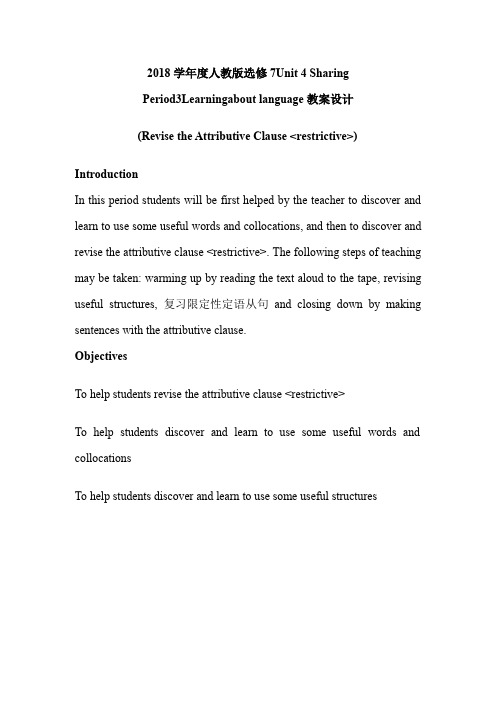
2018学年度人教版选修7Unit 4 SharingPeriod3Learningabout language教案设计(Revise the Attributive Clause <restrictive>) IntroductionIn this period students will be first helped by the teacher to discover and learn to use some useful words and collocations, and then to discover and revise the attributive clause <restrictive>. The following steps of teaching may be taken: warming up by reading the text aloud to the tape, revising useful structures, 复习限定性定语从句and closing down by making sentences with the attributive clause.ObjectivesTo help students revise the attributive clause <restrictive>To help students discover and learn to use some useful words and collocationsTo help students discover and learn to use some useful structuresProcedures1. Warming up by reading the text aloud to the tapeReading aloud to the recording of the text improves our literacy skills—reading, writing, speaking, and listening. Now read the text aloud. Now read the text aloud to the tape2. Discovering useful words and collocationsTurn to page 32 and do exercises 1 and 2.3. Revising useful structuresNow you may turn to page 32 to do exercises 1.You are to finish the sentence with your own words.Next you are going to do exercise 2 on page 32.4. 复习限定性定语从句一、限定性定语从句中关系代词的用法1.who, whom, that三者都可修饰人,who作主语,whom作宾语,that既可作主语又可作宾语.(1)I don’t like people who lose their tempers easily.我不喜欢爱发脾气的人。
- 1、下载文档前请自行甄别文档内容的完整性,平台不提供额外的编辑、内容补充、找答案等附加服务。
- 2、"仅部分预览"的文档,不可在线预览部分如存在完整性等问题,可反馈申请退款(可完整预览的文档不适用该条件!)。
- 3、如文档侵犯您的权益,请联系客服反馈,我们会尽快为您处理(人工客服工作时间:9:00-18:30)。
Unit 4 Sharing language points课时作业Ⅰ.单句语法填空1.(2019·浙江卷)At the start of this year,foreigners living in Italy amounted(amount)to 4.56 million of a total population of 60.6 million.2.(2019·北京卷)According to Johnson,avoiding absorption is actually(actual)easy.3.(2019·重庆卷)But there is something unclear for me,so I would appreciate(appreciation)it if you could give me more information.4.(2019·广东卷)You will need to be committed,patient and sensitive(sense)to others.5.We were not companions.We were not suitable(suit)to each other.6.He has a good occupation and occupies an important position in the company.(occupy) 7.It took them two years to construct the bridge and the construction was excellent.(construct)8.In my opinion,he is reliable and you can rely on him.(reliable)9.The man has been addicted to smoking for many years,but he is now fighting his addiction to smoking.(addict)10.My house is in a convenient place,near the station,please come to me at your earliest convenience.(convenient)11.Do you ever argue with your family about which TV programme to watch?Last night,my parents and I were in a huge argument,and I was really upset about it.(argue) Ⅱ.单句改错1.It was 8:00 that he telephoned me and told me the news.that→when或was后加at2.You may rely on that he’ll come to meet you.on后加it3.By the time he realizes he walked into a trap,it’ll be too late for him to do anything about it.walked前加has4.Exhausting,I slid into bed and fell fast asleep.Exhausting→Exhausted5.Cycling is highly beneficial for health and the environment.for→to6.It was not until he came back which we got the news.which→that7.Compared that house,I show great love to this pared→Comparing8.The deal just isn’t working on the way we promised.on→out9.At average,people who don’t smoke are healthier than people who do.At→OnⅢ.完成句子1.It was not until midnight(直到半夜)that we got home because of traffic jams.2.My father went home from work,tired and hungry(又累又饿).3.Come to see me whenever it is convenient to you(无论你什么时候方便).4.Compared to/with American culture(和美国文化比较起来),Chinese culture has a longer history.5.How long has the young writer been occupied in writing(专心写)his new book?6.On the one hand I admire his gifts(一方面我羡慕他的才能),but on the other hand I distrust his judgment.7.It was on June 11th last year(是在去年六月十一号)that we visited the Great Wall together.Ⅳ.阅读理解AA year ago company in west Michigan.His wife,Gerrie,was still working in the local school cafeteria,but work for Dave was scarce,and the price of everything was rising.The Fusses were at risk of joining the millions of Americans who have lost their homes in recent years.Then Dave and Gerrie received a timely gift—$7,000,a legacy(遗产)from their neighbors Ish and Arlene Hatch,who died in an accident.“It really made a difference when we were going under financially,”says Dave.But the Fusses weren’t the only folks in Alto and the neighboring town of Lowell to receive unexpected Lega from the Hatches.Dozens of other families were touched by the Hatches’ generosity.In some cases,it was a few thousand dollars;in others,it was more than $100,000.It surprised nearly everyone that the Hatches had so much money,more than $3 million—they were an elderly couple who lived in an old house on what was left of the family farm.Children of the Great Depression,Ish and Arlene were known for their habit of saving.They thrived on(喜欢)comparison shopping and would routinely go from store to store,checking prices before making a new purchase.Through the years,the Hatches paid for local children to attend summer camp when their parents couldn’t afford it.“Ish and Arlene never asked if you needed anything,”says their friend Sand Van Weelden,“They could see things they could do to make you happier,and they would do them.”Even more extraordinary was that the Hatches had their farmland distributed.It was the Hatches’wish that their legacy—a legacy of kindness as much as one of dollars and cents—should enrich the whole community(社区)and last for generations to come.Neighbors helping neighbors—that was Ish and Arlene Hatch’s story.[语篇解读]本文讲的是邻里互助的故事。
1.According to the text,the Fusses________.A.were employed by a truck companyB.were in financial difficultyC.worked in a school cafeteriaD.lost their home解析:选B细节理解题。
由文章第一段The Fusses were at risk of joining the millions of Americans who have lost their homes in recent years.及It really made a difference when we were going under financially.可知答案为B。
